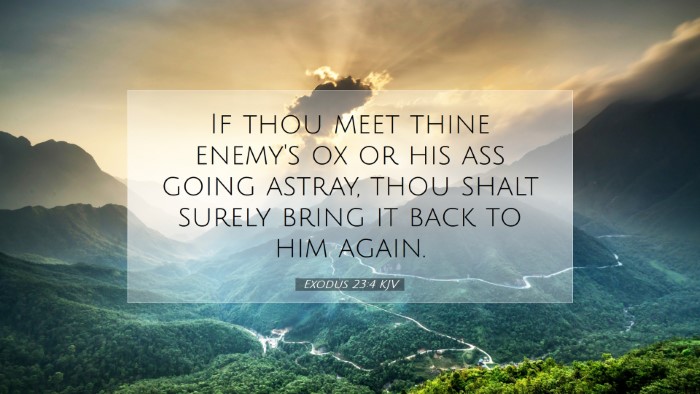Exodus 23:4 - Commentary and Insights
Verse: "If you meet your enemy's ox or his donkey going astray, you shall bring it back to him." (Exodus 23:4, ESV)
This passage presents significant moral principles regarding restitution and kindness even towards one's enemies. The instruction to return a stray animal belonging to an adversary illustrates a deep-rooted call for ethical conduct in all interpersonal relationships.
Contextual Background
Exodus 23 is a part of the covenant code that addresses various aspects of Israelite law, including social justice, ethical treatment of others, and the importance of righteousness within the community. The laws outlined in this chapter aim to cultivate a society characterized by fairness and compassion.
Commentary Insights
Matthew Henry’s Commentary
Matthew Henry emphasizes that this command showcases a Christian spirit, which transcends natural inclinations to harbor ill feelings towards enemies. He suggests that the notion of returning a stray animal is a test of one’s moral character. Henry notes:
- Principle of Love: The teaching serves as a reminder that love must extend beyond friends and kin, urging believers to demonstrate benevolence even towards adversaries.
- Demonstration of Integrity: By returning the lost animal, a person exemplifies integrity and respect for ownership, aligning with God's principles of justice.
Albert Barnes’ Notes
Albert Barnes provides a deeper exploration of the practical implications of this command. He writes about the value of enforcing respect for property rights and the transformative power of kindness. Barnes highlights the following points:
- Restoration over Revenge: The act of returning an enemy's property symbolizes a higher moral duty, which stands in stark contrast with typical human reactions against foes.
- Social Responsibility: This law fosters a sense of community responsibility, where each member looks out for the welfare of not just friends but also foes, promoting societal harmony.
Adam Clarke’s Commentary
Adam Clarke interprets this verse as a foundational principle for justice and fairness. He highlights the spiritual implications of the act of returning the stray:
- Reflection of God’s Character: Clarke asserts that demonstrating kindness towards enemies is reflective of God's character, illustrating mercy and kindness regardless of individual circumstances.
- Cultivating Peace: He emphasizes that such actions can prevent animosity and cultivate peace, allowing for restoration in relationships that would otherwise remain strained.
Theological Themes
At its core, Exodus 23:4 embodies several theological themes relevant to understanding God's expectations of His people:
- Ethical Conduct: The verse stresses the importance of ethical obligations beyond personal gain, calling for a standard of righteousness that reflects God’s holiness.
- Reflection of Divine Purpose: Acting justly towards others, including enemies, partakes in God's overarching narrative of redemption and reconciliation.
- Learning Mercy: The command also embodies the principle of mercy, whereby showing kindness can lead to opportunities for grace and forgiveness.
Practical Applications
The implications of Exodus 23:4 extend beyond ancient Israelite law into contemporary Christian living. Pastors, students, and theologians can draw the following applications:
- Cultivating an Attitude of Kindness: Embrace intentional acts of kindness, especially towards those perceived as adversaries, reinforcing the call to love enemies as an expression of Christ-like behavior.
- Encouraging Restitution: In communities, champions of justice should advocate for restitution and reconciliation, promoting restorative justice practices.
- Fostering Community Relationships: Churches and faith communities ought to model behavior that prioritizes the welfare of neighbors, reinforcing respect for others' rights and property.
Conclusion
Exodus 23:4 serves as a pivotal reminder of the ethical standards to which God calls His people. It challenges believers to extend kindness and justice, even towards those who oppose them. By adhering to such teachings, one not only fulfills a moral obligation but also reflects the heart of God’s love and justice in a world often marred by conflict and division.


